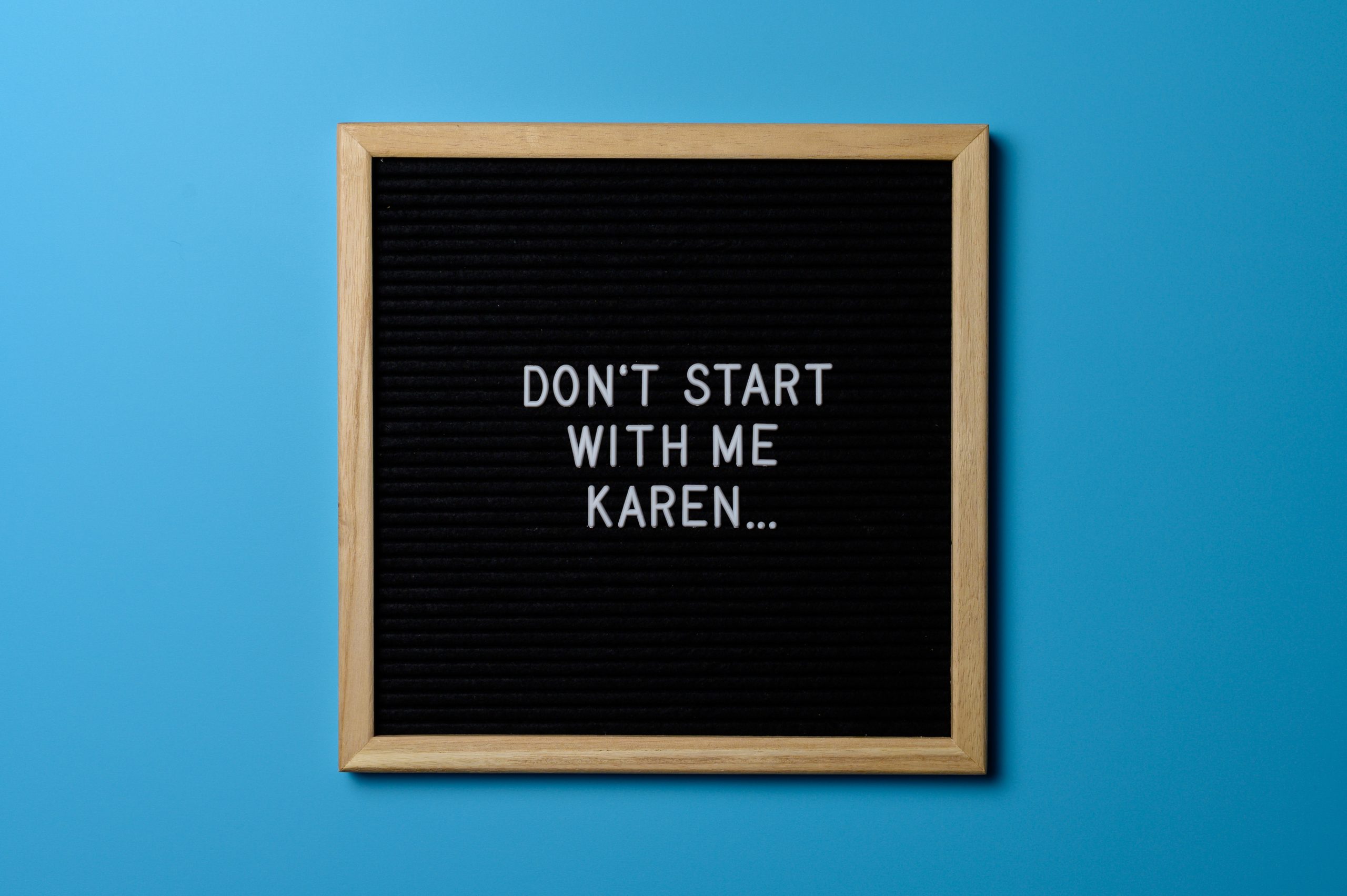- DUI
- Criminal Defense
- Florida DUI
- Traffic Offenses
- Drug Charges
- Marijuana Charges
- Violent Crimes
- Domestic Violence
- Temporary Injunctions
- Weapons Charges
- Theft Crimes
- White Collar Crime
- Juvenile Offenses
- Sex Crimes
- Violation of Probation
- Early Termination of Probation
- Seal or Expunge Criminal Record
- Criminal Appeals
- US Federal Offenses
- Misdemeanor Charges
- Felony Charges
- Co-Defendant Cases
- College Student Defense
- College Student Hearings
- FSU Students
- FAMU Students
- Florida Panhandle Arrests
- Extradition to Florida
- Bench Warrants / Warrants
- Emergency Bond Hearings
- Gambling Charges
- Drone Arrests
- Marsy’s Law
- UAS Infractions
- Introduction of Contraband
- Lying to Police
- Locations
- Case Results
- Our Firm
- Media
- Resources
- Blog
- Contact Us
The Origin of ‘Karen’ – How the Name Became the Meme
July 15, 2021 Don Pumphrey, Jr. Criminal Defense, News & Announcements Social Share
If you’re on the internet, you’ve probably heard of the ‘Karen’ phenomenon. This previously popular name became one of the internet’s most prolific memes, with Google Trends reporting a huge spike in this search term in July of 2020. With the rise of viral videos, tweets, and posts, someone on the internet can usually find a post regarding someone being a ‘Karen’ every single day. But where did this meme originate? What does it mean to be a ‘Karen’ now? And how does it tie into false allegations? We’ll explore all of these topics and provide resources to help you or a loved one who has been falsely accused by a ‘Karen.’
The Origin of Being a ‘Karen’
Robin Queen, Professor of Linguistics, English Language and Literature, and Germanic Languages and Literatures at the University of Michigan did a deep dive into this issue in her article: “How ‘Karen’ went from a popular baby name to a stand-in for white entitlement.” In this article, Queen explores this term under the lens of language and discrimination after learning about one of the first viral ‘Karens’ — the “Central Park Karen,” Amy Cooper. Amy Cooper’s story broke in May of 2020 when she called the cops on a Black man in Central Park, providing false reports of “assault” and “threatening behavior” when the man was really just lawfully enjoying the Park just like anyone else. She tells emergency operators that “there’s an African-American man threatening [her] life,” when he really filmed the whole exchange and merely asked her to put her dog back on a leash in a leash-only area of the Park. Interestingly, Queen looks into the name’s actual origins, reporting that ‘Karen’ peaked in popularity in 1965, meaning that most ‘Karens’ are now middle-aged white women. This provides the foundation for what a ‘Karen’ represents – an entitled, older, white woman who causes scenes in public and is usually engaging in racist or bigoted behavior while doing so.
As far as the meme of ‘Karen’ goes, Queen reports two distinct threads. The first thread comes from 2018 when the Black community posted memes of white women who use their privilege to falsely report criminal activity usually involving people of color. These memes bore hashtags with some of the first monikers for this type of behavior — #bbqbecky, #permitpatti, #golfcartgail, and #cornerstonecaroline. The second thread originates much earlier, and, surprisingly, from once-popular stand-up comedian Dane Cook. In 2005, Cook wrote and performed a comedy bit about ‘Karen’ being the friend that no one in the friend group actually likes. While this thread is less about the racial or bigoted implications of the now-popular Karen meme, Queen cites it as one of the origins of why the name has been so lambasted.
Years later, in 2017, the name Karen became viral on a website called Reddit. A Reddit user made a parody post ranting about his ex, Karen, who exhibited the entitled, pushy behavior that is now associated with the name.
What it Means to be a ‘Karen’ Now
Going back to Amy Cooper, the incident that brought the recent meaning of Karen to the popular eye in 2020, a ‘Karen’ is now a term to denote a middle-aged white woman (though this can vary) who is entitled, bossy, usually bigoted, and uses their privilege at the expense of others – usually people of color, the LGBTQIAA+ community, and service workers. Though this name originally defined racist or bigoted behavior, it now refers to any type of conservative woman who is pushing their agenda on others, like denying racism exists, hoarding supplies during a pandemic, and platforming against social distancing and vaccines. All of these women have been labeled ‘Karens’ by the internet. A ‘Karen’ also has a signature hairstyle (though this is not entirely accurate and largely for laughs). It is the same short, choppy-style pixie cut that Kate Gosselin donned in 2010.
The Darker Side of ‘Karen’ Behavior
While a viral video or post of a Karen getting her due comeuppance can be humorous for audiences, this type of entitled and problematic behavior can cause real harm, especially to already marginalized people in minority communities or low-wage positions. The ‘Soho Karen,’ Miya Ponsetto, wrongly accused a Black teenager of stealing her cellphone in a Soho hotel, and this incident was caught on camera. In the video, Ponsetto can be seen tackling of fourteen-year-old boy, son of Grammy-winning jazz musician Keyon Harrold Sr. While this incident ultimately led to Ponsetto’s arrest, this type of behavior could have created an extremely dangerous situation for the Black teenager. A more sinister side of these videos is the very real possibility that these false allegations will result in improper arrests, detentions, and even violence, against those targeted – usually people of color and other marginalized groups – who already suffer higher rates of improper arrests and police brutality. False accusations can lead to very real arrests, and extremely detrimental and life-changing consequences for those accused – like violence, prison or jail time, and a lifetime criminal record.
How to Fight False Accusations
While it is easy to brush Karen behavior off as classic entitlement, the consequences of these types of false accusations can be extremely damaging if they go unchallenged. If you or a loved one has been falsely accused of a crime, contract a Tallahassee criminal defense attorney as soon as possible in order to develop a strategy and battle-plan. Don Pumphrey and the legal team at Pumphrey Law Firm will fight for your rights and innocence. Ensure a false accusation is not the basis for the criminal conviction of you or a loved one by calling (850) 681-7777 or sending an online message today to discuss your options during an open and free consultation with an attorney in our legal team.
This article was written by Gabi D’Esposito












